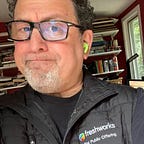Search First, Ask Questions Later
This post is the latest in a series of explorations by @MikeFraietta and me into what we are calling The Control Scale, a guide to digital communication and collaboration. If you’d like to stay up-to-date with our happenings, please subscribe to our mailing list. Yeah, it’s old school, but email is not dead. Mistreated, maybe. But not dead.
We are living in the age of the search engine. Google is a verb (“Google it”) and I live with the expectation that pretty much any information I need is available to me if I take the time to search for it. How do I fix my toilet flapper? How many Euros in a US dollar? Or even How do I play Blackbird on guitar? Pretty much for any question I may have, it’s extremely likely someone has already asked it AND someone has already answered it.
The world we live in — our digital world — presents us this opportunity to search. However, it requires that there be information out there to find. Digital participation requires two activities: search AND share. We’ll cover sharing in another post but it’s important to understand that search and sharing are the yin and yang that underpin our digital world. Suffice it to say you can and SHOULD have an expectation that information is out there for you to find. This is true for you personally, increasingly, it is true for you within your company or organization.
Going Old School
For me, growing up, this wasn’t always the case. Instead of “Google it”, I grew up with “look it up in the dictionary” or “look it up in the encyclopedia.” We had a nice World Book Encyclopedia set for me to find stuff. And it wasn’t a new set — that was too expensive. We had a used set, which meant some of the information was outdated. World Book’s solution to this was to publish annual “year book” supplements as updates.
The problem with encyclopediae (yeah, I had to Google that) is by the time they are published they are out of date. Hence the need for year books to be published to keep them up-to-date. Why is this relevant?
The type of curation done by encyclopediae and the like is important, but is challenged by the velocity of information. Let’s look at communities, be they internal communities in your company or public communities like Linkedin or Facebook. Asking for recommendations is a common occurrence in Facebook groups. Recently, a member of a Facebook group I’m in asked for the group to create a list of recommendations to make it easier for others who may need similar recommendations. And there, my friends, is the problem. You don’t need a list. If you create a list, it’s going to be out of date by the time you create it. What you need to do is search. If you searched in the group for “recommendation plumber” you’d find all the prior posts with recommendations. And it will ALWAYS be up-to-date.
We’re All Curators
Some of the best sources of information on the Internet are self-curated. If you want to find out about someone professionally, how do you do it? Ask people? You probably look at Linkedin. Are all the Linkedin profiles created by a team at Linkedin? No, they are created by individuals who want to make it easy for you to find them and find out about them.
This is the model for creating working and documenting within your organization. If you have an internal employee community, its likely to be one of your best internal knowledge bases.
Consider this premise: you just got assigned to a new team in your company.
- How do you get up to speed? Do you ask your co-workers? Do you expect training sessions or manuals?
- Or, is your expectation that all the information is already out there and you just have to find it?
Which leads to this premise:
- When you work, are you making it easy for others to get up to speed, find your work?
- Are you working in a locked room or are you leaving breadcrumbs for others to discover and get value from your work
Participating in the digital world requires new skills. The mentality many have — the mentality I grew up with — is to curate knowledge and publish it. That no longer serves us well. I’m not saying we no longer need to curate and publish, but more that we need to develop new skills and habits. The first of these skills is search. Learn to search first, ask questions later.
Want to keep up with Control Scale happenings? Subscribe to our mailing list!
